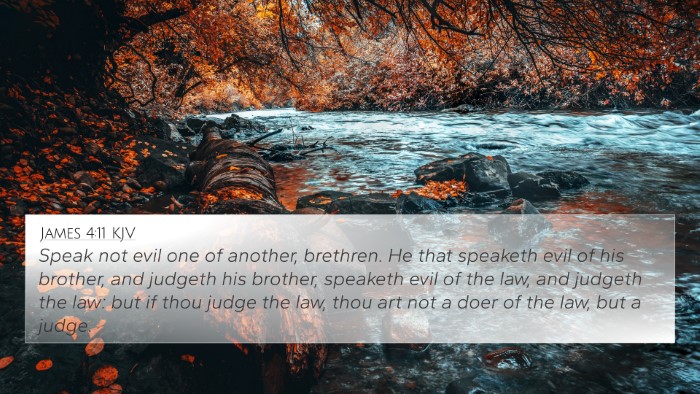Psalms 15:3 - Summary and Interpretation
Psalms 15:3 states, "He who does not backbite with his tongue, nor does evil to his neighbor, nor takes up a reproach against his friend."
This verse outlines essential characteristics of a righteous person, emphasizing the importance of integrity and respect for others. The context is a part of a larger discourse on who may dwell in the presence of the Lord, highlighting moral and ethical conduct.
Key Insights from Public Domain Commentaries
-
Matthew Henry's Commentary:
Henry emphasizes that a true follower of God exhibits self-control, particularly with the tongue. Backbiting, or speaking ill of others, undermines community and harms relationships. The righteous person avoids slander, treats neighbors with goodness, and refrains from accepting gossip against friends.
-
Albert Barnes' Notes:
Barnes underscores the importance of social ethics in faith. He notes that the moral conduct outlined in this verse illustrates how one’s relationship with God is reflected in their relationships with fellow humans. He stresses that true worship is inherently linked to righteous living.
-
Adam Clarke's Commentary:
Clarke provides a deeper understanding of the implications of this verse. He explains that not only are actions significant, but the intentions behind them are critical. He urges believers to maintain a heart aligned with God’s truth, showing kindness to others without any double standards.
Connected Bible Verse Analysis
Psalms 15:3 shares thematic connections with various Bible verses that similarly discuss the righteousness and integrity required of God's people. Here are 10 significant cross-references:
- Proverbs 12:18: "There is one whose rash words are like sword thrusts, but the tongue of the wise brings healing." This echoes the theme of the impact of our words.
- Ephesians 4:29: "Let no corrupting talk come out of your mouths, but only such as is good for building up, as fits the occasion, that it may give grace to those who hear." This draws a direct line between speech and community edification.
- James 3:5-10: This passage underscores the powerful effect of the tongue, showing its capacity for both good and evil.
- Proverbs 20:19: "Whoever goes about slandering reveals secrets; therefore do not associate with a simple babbler." This links slander to the character of the slanderer.
- 1 Peter 3:10: "For whoever desires to love life and see good days, let him keep his tongue from evil and his lips from speaking deceit." Aligning with the call for holy living.
- Matthew 5:11: "Blessed are you when others revile you and persecute you and utter all kinds of evil against you falsely on my account." This speaks to the idea of enduring unjust treatment without retaliation.
- Romans 12:17: "Repay no one evil for evil, but give thought to do what is honorable in the sight of all." This emphasizes active goodness over retribution.
- Galatians 5:14: "For the whole law is fulfilled in one word: 'You shall love your neighbor as yourself.'" Rooted in love and respect, akin to the precepts in Psalms 15:3.
- Luke 6:31: "And as you wish that others would do to you, do so to them." This mirrors the golden rule that serves as a foundation of righteous behavior.
- Colossians 3:8: "But now you must put them all away: anger, wrath, malice, slander, and obscene talk from your mouth." A reminder of the behaviours to be shunned by believers.
Thematic Connections and Practical Applications
This verse teaches essential lessons in how we engage with others and the importance of our speech in fostering a community that reflects God's love. The prohibition against gossip and slander is not just about refraining from negative speech, but also about actively doing good to those around us, illuminating our witness as followers of Christ.
Tools for Bible Cross-Referencing
For deeper study, believers can utilize tools such as:
- Bible concordance
- Bible cross-reference guide
- Cross-reference Bible study techniques
- Bible chain reference systems for thematic studies
By utilizing these resources, one can gain a richer understanding of the connections between various scriptures and how they interrelate within the broader narrative of God's word.
Conclusion
Psalms 15:3 serves as a powerful reminder of the ethical requirements placed upon those who seek to live in accordance with God’s will. By intertwining threads of ethical conduct, relational integrity, and a commitment to speaking truth, this verse invites believers into a deeper relationship with one another and with God.


















